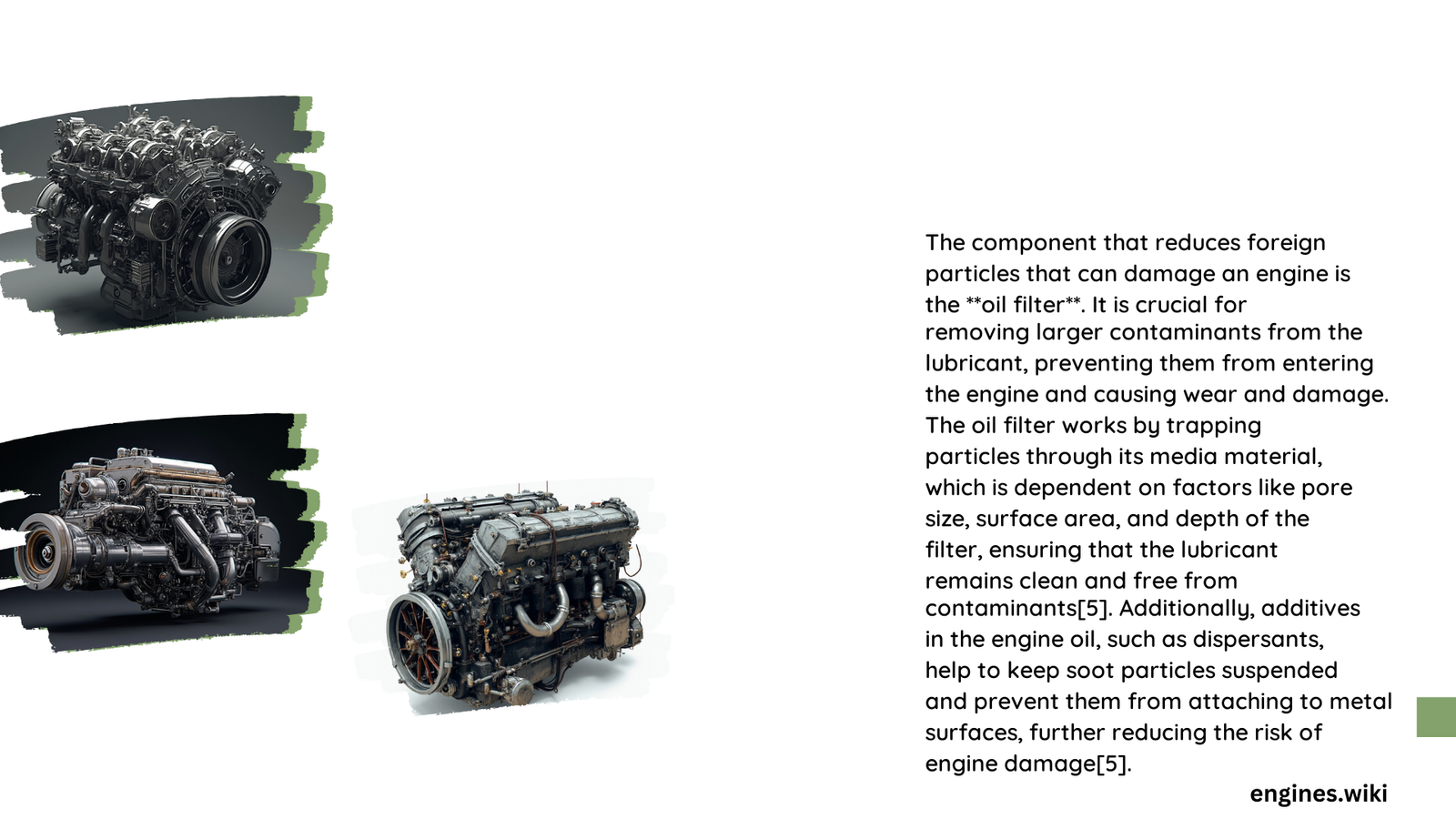Several components work together to reduce foreign particles that can damage an engine. These include the air filter, oil filter, fuel filter, and engine oil separator. Each plays a crucial role in protecting the engine from contaminants, but they differ in their filtration efficiency, particle size capabilities, and overall impact on engine longevity. This article examines these components in detail to determine which is most effective at reducing harmful foreign particles.
What Are the Key Components That Protect Engines from Foreign Particles?
The primary components that reduce foreign particles in engines are:
- Air Filter
- Oil Filter
- Fuel Filter
- Engine Oil Separator
Each of these components targets different types of contaminants and protects specific parts of the engine system.
How Does the Air Filter Protect the Engine?

The air filter is the first line of defense against airborne contaminants entering the engine. It plays a crucial role in:
- Preventing dust, dirt, and debris from entering the engine’s combustion chamber
- Maintaining the proper air-to-fuel ratio for optimal engine performance
- Extending the life of engine components by reducing wear from abrasive particles
Air Filter Specifications:
- Filtration Efficiency: High-quality air filters, such as those using Donaldson Power Core Ultra Web technology, boast a filtration efficiency of 99.97%.
- Particle Size Retention: Can capture particles as small as 0.3 microns.
- Material: Typically made from paper (cellulose), foam, or synthetic media.
What Role Does the Oil Filter Play in Engine Protection?
The oil filter is essential for maintaining clean engine oil, which is vital for proper lubrication and heat dissipation. It:
- Removes metal particles, carbon, and other contaminants from the oil
- Prevents abrasive particles from circulating through the engine
- Helps maintain oil viscosity and effectiveness
Oil Filter Specifications:
- Filtration Efficiency: Varies with the number of passes. A stock oil filter might have a single-pass efficiency of 68% for 20 micron particles, increasing to 99.66% after five passes.
- Particle Size Retention: Can capture particles down to 20 microns or smaller, depending on the filter quality and number of passes.
- Material: Usually composed of cellulose, synthetic fibers, or a blend of both.
How Does the Fuel Filter Contribute to Engine Protection?
The fuel filter prevents contaminants in the fuel from reaching the engine’s sensitive components. It:
- Removes particles and impurities from the fuel
- Protects fuel injectors and other fuel system components from clogging
- Ensures consistent fuel flow for optimal engine performance
Fuel Filter Specifications:
- Filtration Efficiency: Typically ranges from 90% to 99% for particles in the 5-10 micron range.
- Particle Size Retention: Usually captures particles down to 5-10 microns.
- Material: Often uses cellulose or synthetic media.
What Is the Function of the Engine Oil Separator?
The engine oil separator, while not a traditional filter, plays a unique role in reducing oil contamination:
- Separates oil droplets from blow-by gases in the crankcase
- Prevents oil from entering the combustion chamber
- Reduces emissions and maintains engine cleanliness
Engine Oil Separator Characteristics:
- Separation Method: Uses baffles, centrifugal force, or coalescing media to separate oil from gases.
- Efficiency Measurement: Not typically measured in the same terms as particle filters.
- Design: Varies widely depending on the engine and vehicle manufacturer.
Which Component Is Most Effective at Reducing Foreign Particles?
To determine which component is most effective, we need to compare their performance:
| Component | Filtration Efficiency | Particle Size Retention | Impact on Engine |
|---|---|---|---|
| Air Filter | 99.97% | Down to 0.3 microns | Significant reduction in airborne contaminants |
| Oil Filter | Up to 99.66% (after multiple passes) | Down to 20 microns | Crucial for maintaining clean oil circulation |
| Fuel Filter | 90-99% | 5-10 microns | Essential for protecting fuel system components |
| Engine Oil Separator | N/A (different function) | N/A | Important for preventing oil contamination in combustion chamber |
Based on this comparison, the air filter appears to be the most effective at reducing foreign particles that can damage an engine. It has the highest filtration efficiency and can capture the smallest particles. Over 108,000 miles, a high-quality air filter allows only 1.1 grams of dirt to pass into the turbo, compared to 241 grams with a lower-efficiency filter.
However, it’s important to note that each component plays a vital role in protecting different aspects of the engine system. The combined effect of all these components working together provides comprehensive protection against foreign particles.
How Often Should These Components Be Maintained or Replaced?
Regular maintenance is crucial for ensuring these components continue to protect the engine effectively:
- Air Filter: Replace every 15,000 to 30,000 miles
- Oil Filter: Replace every 5,000 to 7,500 miles
- Fuel Filter: Replace every 15,000 to 30,000 miles
- Engine Oil Separator: Clean or replace every 50,000 to 100,000 miles
Always consult your vehicle’s manual for specific maintenance intervals, as they can vary depending on the make and model of your vehicle and your driving conditions.
In conclusion, while the air filter is arguably the most effective at reducing foreign particles that can damage an engine, all four components – air filter, oil filter, fuel filter, and engine oil separator – work in concert to provide comprehensive protection for your engine. Regular maintenance of all these components is essential for ensuring optimal engine performance and longevity.
References
- https://www.ford-trucks.com/forums/846124-air-filters-and-oil-filters-how-well-do-they-filter.html
- https://www.texairfilters.com/comparing-filters-for-resistance-and-efficiency/
- https://www.fram.com/vehicle-maintenance-center/post/the-different-types-of-engine-air-filters-and-how-they-work
- https://www.donaldson.com/en-us/engine/filters/technical-articles/air-filter-efficiency/
- https://www.airfiltersdelivered.com/blogs/helpful-tips/merv-mpr-fpr-ratings
